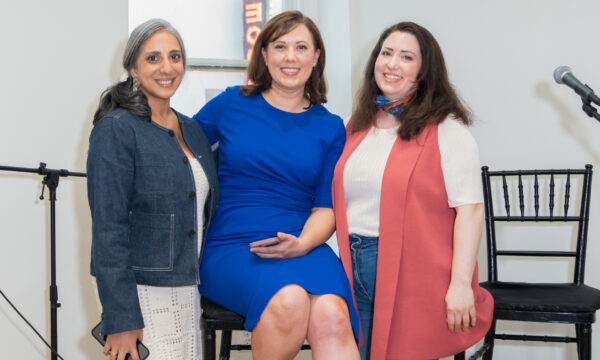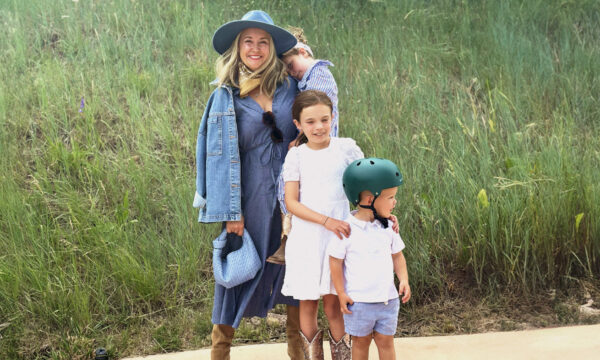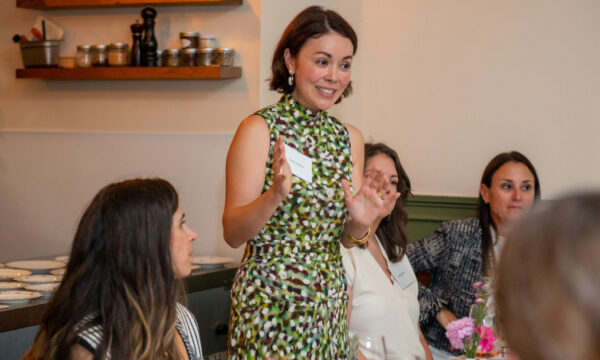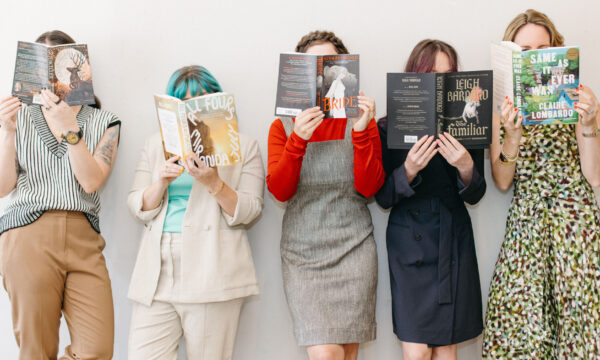
Stephanie wears the Gwynne dress.
What You Learn When You Nanny for the Ultra-Rich
An excerpt from Stephanie Kiser’s best-selling memoir, Wanted: Toddler’s Personal Assistant
For seven years, Stephanie Kiser worked as a nanny for the richest families in New York City. The lessons she learned about class, motherhood, and upward mobility in America would stick with her forever—and you can read about them for yourself in her new, national best-selling memoir, Wanted: Toddler’s Personal Assistant. Simultaneously a juicy peek behind the curtain at the real lives of the 1% and a provocative story about class, friendship, and family, it’s a page-turner you won’t be able to put down.
Below, read an excerpt from Wanted: Toddler’s Personal Assistant in which Stephanie describes an afternoon with Ruby and Hunter, the children she nannied for at the time.
In NYC? Join us on September 10th for a conversation between Stephanie Kiser, her former employer, Lindsay Schmidt, and Elle culture writer Lauren Puckett-Pope. RSVP here.
Want more M Dash?
Sign up for our weekly newsletter.
Thank you!
Little Learning
There is consistency in everything Ruby and Hunter do. The children have a schedule, and everyone around them sticks to it. From the moment Sasha wakes them to the second they drift off to sleep, Ruby and Hunter follow a plan. They always know what to expect. When Sasha needs to run an errand, she makes clear not only when she is leaving but when she’ll be back. They have weekly classes. Monthly playdates. Daily baths. Their lives are flawlessly structured. I imagine such predictability is a relief.
By the time I arrive at work at nine a.m., Sasha already has Ruby dressed in an Oscar de la Renta dress. Her hair is combed and neatly braided with a small bow pinning it back. Ruby is more elegant on weekday mornings than Queen Elizabeth was at a Sunday mass. I cannot recall any moment in my twenty-two-year history that I ever looked as graceful as Ruby does, and that is because there hasn’t been one.
This is the sort of outfit she always wears on school days. The dress, embroidered with palm trees, is valued at four hundred twenty-five dollars. I know this because I removed the tag myself just days before. I place it in her closet, jamming it in among a row of similar dresses. I begin to wonder, even given the means, if I’d spend nearly a thousand dollars on an outfit that undoubtedly will not fit the child in less than a year. It seems both exquisite and wasteful.
“What’s the plan for today?” I ask Sasha once I’m settled.
Most days Sasha takes Hunter to his prearranged activities, so I spend most of my time with Ruby, who took to me almost immediately. Sasha had explained that Hunter had never really had a sitter before and is very attached to her. This is fine by me, since Ruby is so consistently well behaved and easier to reason with.
“Ruby has Little Learning from ten to eleven thirty. Then she’ll need a quick lunch before you drop her at school. She’ll probably just want a hot dog.”
“From where?” I ask.
“Just one of the food carts by Central Park.”
“Yeah,” Ruby cheers, “street hot dog!”
For a Fifth Avenue princess, Ruby is surprisingly humble. Despite their wealth and resources, Ruby’s family is relatively low key. I often come in after a weekend to find empty Domino’s boxes in the recycling bin or a melted Ben & Jerry’s carton in the sink. Sasha and her husband both grew up on Fifth Avenue. They have only ever known this life of glamour, yet they poke fun at fancy dinner parties where the main courses are the size of gumballs and the guests spend the evening bragging about their private yachts.
Sasha and Ian should be the worst kind of Upper East Siders, but I find them unpretentious.
“I’ve left some cash on the table. Feel free to get yourself some- thing to eat, too,” Sasha instructs as she wrestles Hunter into his Armani coat.
“Wait, where is Little Learning?”
“It’s just a few blocks away,” she answers before heading out the door, “on the corner of East 81st and Fifth. You can’t miss it.”
When Sasha and Hunter leave, I turn to Ruby, who is a few licks into a lollipop that’s turned her mouth the same color as Taylor Swift’s signature lipstick. It’s early in the day for candy, but Sasha’s lax parenting philosophy allows it.
I help Ruby into a pair of black ballet flats and tie my Nikes before we head out to stroll, hand in hand. She calls out taxis that have their lights off. If one passes with its lights on, it is my responsibility to announce it. What the game lacks in complexity it makes up for in thrill. Ruby shrieks with surprise at an unoccupied cab that drives by. She and I continue the silly game until we reach our destination. Number 4 East 81st Street is a three-story brownstone that sits directly across from one of the most prestigious art museums in the world. I cannot imagine what sort of children’s class would require such a fancy facility, and for a second, I assume Sasha has mistaken
the address.
“No, this is it,” Ruby insists. “See?”
She points to the doorbell. Sure enough, on a sign no bigger than my pinkie finger are the words: Little Learning. I press the button, and we’re buzzed in.
“Hello,” a woman calls from behind her desk, to the right of a grand marble fireplace. The room looks more like a young heiress’ bachelorette pad than it does a place for toddler education. The hard- wood floor is covered in a fur rug, and beige furniture crowds the sitting area. Lines of bookcases display famous children’s books. I think back to the elementary school in my hometown. The broken desks and the dim fluorescent lighting. The borrowed textbooks with penis doodles around the pages. Perhaps I would have learned better had I been studying in a chic penthouse instead of a medieval lair.
“Who do we have here?” The woman continues.
“Ruby Ross, in the ten o’clock class.”
“All right, Ruby, you can go ahead downstairs and find your teacher.” Then she lowers her voice as if she’s about to reveal a secret. “I heard you’re baking things that start with the letter C today.”
Ruby, who is shy, stands timidly behind me. Eventually, with some gentle coaxing, she descends the stairs. I listen to Ruby’s steps disappearing until it is silent. There are a few empty seats, and I choose one next to someone who is most likely a nanny, speaking quickly into a Bluetooth headset. She eyes me suspiciously as I sit down. I smile, but she doesn’t return the gesture, and I assume she thinks I’m just another nosy Upper East Side mom trying to eaves- drop on her phone call. Maybe she’s right about the nosy part, at least.
“Ah, si, si. Katherine is at Little Learning now, but her class only goes another fifteen minutes.”
With a closer look, I realize that I recognize the nanny from Ruby’s school. Her name is Elissa, and she watches a sweet-faced girl with freckles and a front tooth gap.
“Oh, yes, it’ll be an early night. I should be out of work at seven, home by eight.”
She spends the next few seconds nodding in agreement with whomever speaks from the other side.
As Elissa’s conversation carries on, I Google the cost of Little Learning classes. Five hundred dollars. I feel my eyes grow wide. Five hundred dollars a class?
How long is this class? How many kids? Surely, the student- teacher ratio must be one-to-one for that sort of money. Even then, it seems absurd.
“Katherine is almost done,” Elissa says, beside me. “We have to go to ballet now. I’ll call you on my way home. Si. Si. Nos vemos.” Elissa clicks off the phone.
As she begins to gather her things, I decide it’s my chance to finally make a nanny friend. Nannying isn’t the sort of job that provides coworkers. While my friends enjoy chatting with work friends over weekly lunches of catered Chipotle and hearty salads from Sweetgreen, I eat my lunch with a two-year-old on my lap. When my weekday commute ushers me past the hustle and bustle of the offices in midtown, I picture a group of twenty-something professionals at a happy hour. Lila often describes outings with her paralegal coworkers; they can’t afford fancy spots just yet, but they happily drop five dollars a beer at an East Village watering hole when they can. While I’ve grown to enjoy my workdays, this is not where I want to be. I wanted a career, not just a job, and this hardly qualifies as either. Everyone I encounter during my workday seems either too young or too old to be a friend. I’m becoming desperate, so I take a breath, gather my confidence, and introduce myself.
“Hi, I’m Steph. I’m Ruby’s nanny,” I say holding out my hand. Elissa looks at me with reservation but eventually accepts the greeting.
“Elissa. Katherine’s nanny.”
“I’ve seen you at school a few times,” I continue.
“The girls are not in the same class,” she says flatly.
I feel the sting of embarrassment—of social ineptitude—but I am confused. In college, I could roam the hall of my dorm and have five new friends in minutes. Here, only a year later, all the money in the world wouldn’t get this sixty-year-old woman to converse with me. This is some sort of rock bottom. The woman in front of me is not interested in the cute Zara sweater I’m wearing or the downtown clubs where I know the bouncers. I’m not like her. I’m also not like the mothers around here. So where do I fit in?
“Where are you from?” she asks after a moment.
Glad to see a flicker of interest, I quickly respond, “Rhode Island.”
“Long Island?”
“No, Rhode Island. Like near Boston.” She stares at me blankly.
Just then, a class is released, and I watch a group of three-year-olds stumble up the stairs. I count two teachers and five students. Katherine is one of them. The teachers hand the children off to their stay-at-home moms or nannies who have trickled in as Elissa and I attempt conversation. When it’s Katherine’s turn, one of the teachers bends down to meet her at eye level.
“Katherine, do you want to tell your nanny what you read to the class today?” Sheepishly, Katherine nudges her chin into her shoulder. “Come on,” the teacher encourages. “Show Elissa what you read.” Slowly, the three-year-old pulls out a book that had been tucked underneath her arm. I recognize the cover. Chicka Chicka, Boom Boom. I too had once learned to read the beloved story—when I was eight years old and in the second grade.
“I read all the pages but one,” she says proudly.
“Last week she had trouble with the T, U, V pages, but our teaching assistant recognized today she was simply confusing U and Y sounds. We corrected it in no time.” Her teacher smiles.
I watch as the teacher and nanny clap in celebration. Everyone is so proud. Even I, a complete stranger to this child, am impressed. I wonder, What if I had gone to Little Learning? I’d spent my entire childhood being labeled “delayed.” But was I? Was little Katherine a uniquely fast learner or is this what you get for five hundred dollars an hour?
I begin to think maybe I hadn’t been slow after all. Maybe I had just been born into the wrong class.











